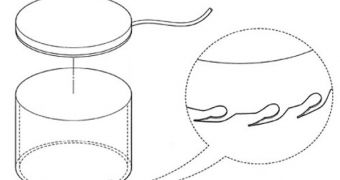A new type of sensor will solve issues related to the fact that most neuron activity readers don't stay in place for very long periods of time, thus giving doctors and surgeons a hard time in reading their data and making informed decisions based on them. The newly-designed electrode features small, microscopic teeth, placed horizontally on its lower surface, which are simply "screwed" into the skin.
Mingui Sun, a researcher at the University of Pittsburgh says that the procedure is not at all painful, as the teeth, no matter how sharp, only catch on to the top layer of the skin. But the advantages that these systems would produce if implemented, would be substantial, as opposed to those currently obtained by using regular electrodes, which are glued to the surface of the skin. They encounter major difficulties in staying attached to the scalp, especially if the patient has thick hair.
Neurosurgery is just one of the fields of medicine that could benefit from the new, button-shaped electrode. Being able to get a steady flow of information is vital for this type of surgeries, where the life of the patient hangs by a thread. Furthermore, it can prove to be an invaluable tool in operations that seek to implant other devices in the brain, as for instance, chips that allow people to control prosthetic limbs.
Using the new sensor is very easy and intuitive – simply press it against the skin and twist lightly. The teeth will immediately get a hold of the skin, and the electrode will remain in place until the doctor twists it the other way around and then lifts it. This allows it to remain in strong electrical contact with the neurons it's tracing, thus eliminating the possibility for false readings, which regular electrodes give off when they slip from their original place.

 14 DAY TRIAL //
14 DAY TRIAL //